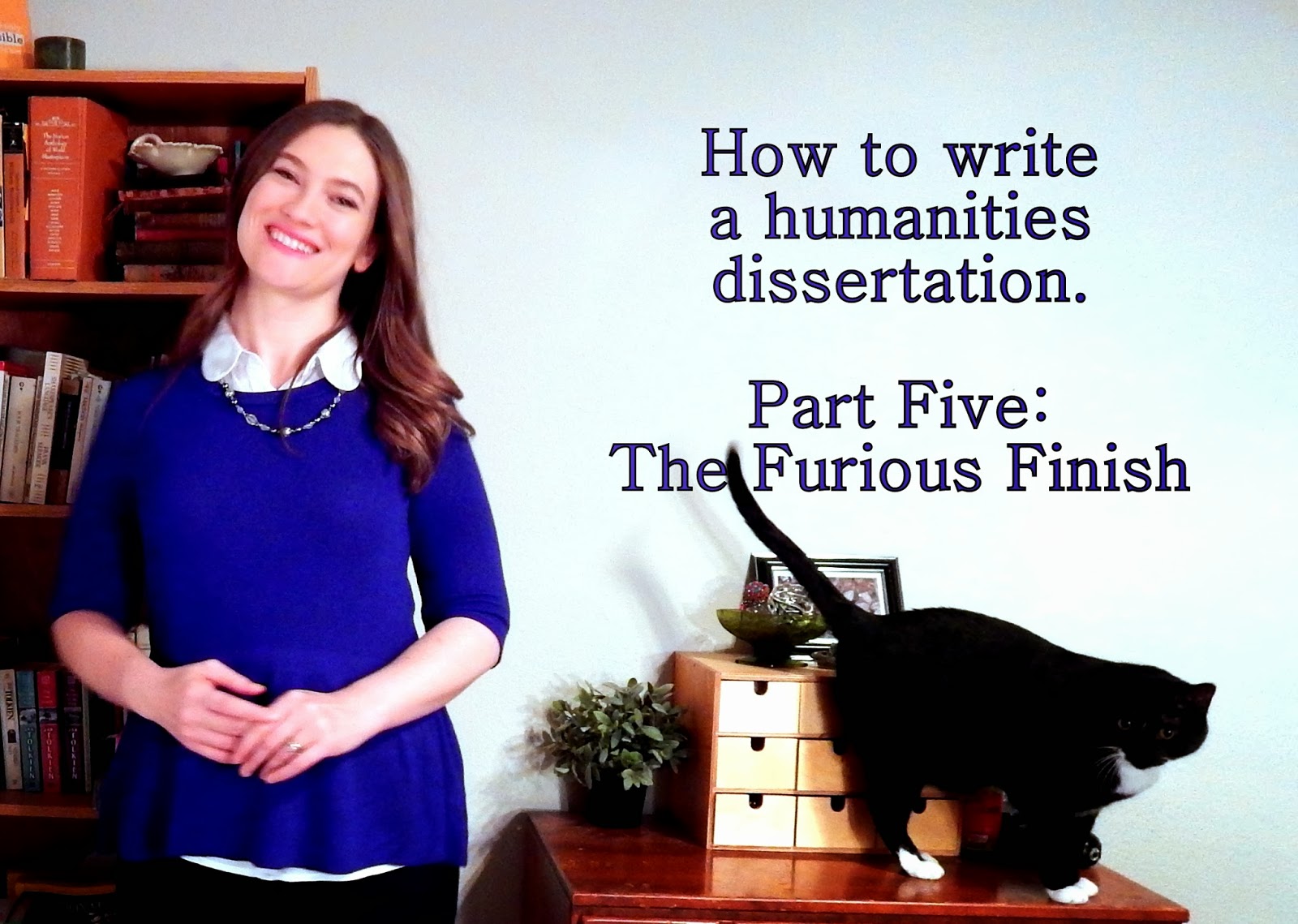How to write a humanities dissertation, part five: The Furious Finish
(See part 1, part 2, part 3, and part 4.)
Step 1: After your advisor has read your draft, meet with him or her to discuss it. If you are very lucky, he or she will only have minor things to discuss with you. You will be relieved that he finally approved of the way you handled that ongoing quibble over a definition. You will be less relieved when he tells you that you "should have included such and such" and you are forced to remind him that you did include such and such -- in chapter 3. This will cause you to believe that he has not read very much of your draft. You could get depressed about this or you could see it as a great gift to you -- he trusts you; he doesn't need to pore over every detail; and, most importantly of all, he wants to help you graduate on time. These are all good things.
Step 2: Revise and edit for the kind of grammar issues that ceased to be issues 50 years ago, but which your advisor finds very important. Again, you could choose to be upset about having to spend time making sure you never use "impact" as a verb, or you could be happy that this is really all that is being required of you at this point. It means your draft was good.
Step 3: Submit your revised draft to all committee members and await their responses anxiously. The school year has now begun, and you have a checklist of steps to graduation in front of you at all times. Over the next few months, checking off each step on this list will prove a great source of comfort and accomplishment to you. Right now, you are stuck waiting for step one on the second list, because until you get this first round of feedback, your supervisor will not declare you ready to defend. You will be stuck at this phase for a while.
Step 4: While you await responses from your committee, you will be faced with the unsavory task of editing for format. If you are very dumb, or perhaps just overly optimistic, you will have written the entire draft in MLA format, all-the-while knowing that you will have to convert it to Turabian later. You will now embark on this terrible conversion process. Following Turabian format is not so terrible, but getting your free version of Open Office Writer to do the properly sized and spaced footnotes conforming to the university's strict formatting requirements becomes a work of divine grace. After all that work slaving away over your research and writing, you will feel, in the moments that you comb the internet for solutions to your word-processing formatting issues, that you will not finish your PhD after all -- that you will die of formatting. But you will slug along, you will triumph over machine, and you will produce a properly formatted, 250-page work of art that Kate Turabian herself would be proud to behold.
Step 5: If you are lucky, your committee will approve whatever your supervisor has approved, quickly, and without drama. You may then apply final edits, get your supervisor's approval, and proceed to that long-awaited step one on the checklist above. Though it will take some patience and legwork to track each committee member down for the required signatures, some coddling of egos for a few minor disagreements on content, and the skill of a circus juggler to deal with their combined scheduling issues, you will eventually emerge with a completed final draft, reams of paperwork, and an agreed-upon defense date. Rejoice! The most difficult part is now over.
Step 6: Defend your dissertation with confidence. At this point, they've already approved you, so have fun with it. Invite fellow students for the public portion so that it feels more like a party than an interrogation. If at all possible, make sure the committee talks more to each other than to you. This will take up time and distract them. In fact, distractions of all kinds are helpful -- dazzle them with the song and dance and lead them on merry rabbit trails -- all shall be well. In general, the defense will be an enjoyable experience, and when they greet you after their final deliberations with the words, "Congratulations, Doctor," you will experience a wave of euphoric relief that should help you get through the final hoops -- seven hoops, to be exact.
Step 7: Become an all-star hoop-jumper. There will be more formatting issues to correct. Remember the happy feeling after your defense to help you correct them. Then there will be the printing and the sorting and the carrying of heavy manuscripts back-and-forth across campus in the rain, as you try desperately to keep these precious pages dry so that they can be submitted for binding. There will be online submissions and surveys and signatures. Then, with gusto, you will brandish your red pen and check off your final step.
Step 8: Graduate! Perhaps your actual ceremony will be cancelled because of a rogue ice storm. If that's the case, you should by all means wear that doctoral cap (which you now know is called a "tam") around your house all evening as if it were a beret.
If the powers that be should reschedule your hooding ceremony for a time and place with somewhat less pomp and circumstance, be grateful for the short ceremony and the snacks. Then take your diploma and run.






I love this, Christine. :) I'm not really a blog reader/writer, but I thoroughly enjoyed this post. You have such a graceful, humorous voice, and you provide so much valuable information. I need it as I hope to graduate with my Ph.D. Dec. 2015.
ReplyDeleteThanks, Anonymous! Good luck with your degree!
Delete